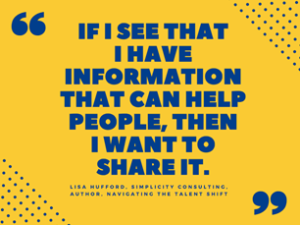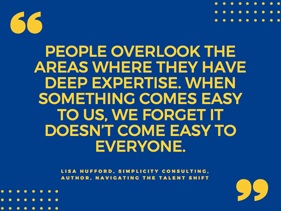I recently had the opportunity to interview Lisa Hufford, author of Navigating the Talent Shift, and founder and CEO of Simplicity Consulting — a $40M on-demand marketing and communications consulting business in the Pacific Northwest. The sad truth is that there are far too few women CEOs who have written a well-respected business book to showcase their ideas and build their brand, so I was intrigued to speak with Lisa right from the start.
Lisa was initially motivated to start her company in 2006 to gain more flexibility in her own life by moving from full-time work at Microsoft to consulting. Her previous employer was her first client. Her move corresponded to a growing trend with companies seeking to outsource talent at the same time as employees were increasingly seeking more flexibility and control over their schedules. Indeed, by 2020 it is estimated that 40% of US workers won’t want to be employees and will join the gig economy or pursue, as I did, a portfolio career. Lisa’s business has successfully ridden that trend since Simplicity Consulting helps companies understand the benefits of this new talent pool and how to build on-demand teams.
You’re Building a Successful Business, Why Write a Book?
 As the CEO of a growing business, it’s easy to put your head down and focus on the next project or the next hire. But Lisa took a different path. As she told me, “If I see that I have information that can help people, then I want to share it.” This has led her to regularly be out sharing her expertise gained through her years in corporate America as well as her unique vantage point working with many companies shaping their talent strategy. She has a clear vision about the way people will recruit and hire over the next 5 to 10 years. She recognizes that companies are going to have to re-think their day-to-day business operations to accommodate these trends and she wants to show them the way.
As the CEO of a growing business, it’s easy to put your head down and focus on the next project or the next hire. But Lisa took a different path. As she told me, “If I see that I have information that can help people, then I want to share it.” This has led her to regularly be out sharing her expertise gained through her years in corporate America as well as her unique vantage point working with many companies shaping their talent strategy. She has a clear vision about the way people will recruit and hire over the next 5 to 10 years. She recognizes that companies are going to have to re-think their day-to-day business operations to accommodate these trends and she wants to show them the way.
After sharing her ideas through speaking at industry events and participating as a guest on business podcasts, Lisa decided to hire two ghostwriters to begin the two-year process of codifying what she learned into a business book. She knows that her understanding of the trends is years ahead of others, and she “wants to be already there and be the thought leader in this space” by the time they arrive. She is proud that Navigating the Talent Shift is “not a traditional business book. You can pick it up and put it immediately into action. I wanted to write a book that made a difference right now, today.”
Not Just a Business But a Brand and Even a Movement
 Increasingly, companies are learning that building their brand as a trusted partner helps them attract new clients, talent, and influence. With a book, you begin to differentiate your company from one that is selling services to one with a unique point of view and a stake in the ground. You “become a storyteller who is engaging people,” which is a completely different approach to business as usual.
Increasingly, companies are learning that building their brand as a trusted partner helps them attract new clients, talent, and influence. With a book, you begin to differentiate your company from one that is selling services to one with a unique point of view and a stake in the ground. You “become a storyteller who is engaging people,” which is a completely different approach to business as usual.
 While the book has only been in the market for 7 months, Lisa has already seen that it, “Brings me credibility. Consulting is a very crowded space and with the book, people look at me differently – even my employees and business colleagues. They look at me more as an expert. It has absolutely increased my credibility.”
While the book has only been in the market for 7 months, Lisa has already seen that it, “Brings me credibility. Consulting is a very crowded space and with the book, people look at me differently – even my employees and business colleagues. They look at me more as an expert. It has absolutely increased my credibility.”
Lisa is clear that she is not the first to understand the trends in her market. But, she has joined a movement that is intent on unlocking talent, helping employees to gain “control, flexibility, and the chance to use their skills for work that matters,” while also assisting companies in managing their costs and risks. Building a movement requires that we are not sharing our ideas one individual or company at a time. Instead, we need to move from one-to-one or one-to-many conversations to many-to-many conversations. Writing a book allowed her to scale the influence and impact of her ideas by sharing them widely.
You Learn a Lot Along the Way
 For many years, Lisa held herself back from writing a book because she worried about being seen as bragging or questioned if her ideas were really unique. Now she realizes “you are not bragging if you are representing the facts or what you’ve done.”
For many years, Lisa held herself back from writing a book because she worried about being seen as bragging or questioned if her ideas were really unique. Now she realizes “you are not bragging if you are representing the facts or what you’ve done.”
The biggest surprise during the writing process was, “We all have something that we want to say, but writing a book forces you to get crystal clear on what that is. You truly master your idea.” This has given her a lot of confidence and the two-year slog to complete the book — and assure that it was authentic to her voice and really added value — made her “feel that I can handle anything that comes at me.”
Let’s All Share Our Expertise — Widely
Since the book was released, Lisa has had many opportunities to talk about it and she’s enjoyed the experience. “Putting out your thoughts and ideas and hearing people’s questions is very satisfying. You learn what sparks their interest! What did they take away? What did they learn?” (On the downside, as soon as she finished her first book, people asked, “What’s your next book?” Yes, really. The same thing happened to me.)
 Lisa regularly encourages CEOs to write their own book and has been surprised that they have all demurred. She realizes that many people “overlook the areas where they have deep expertise. When something comes easy to us, we forget it doesn’t come easy to everyone.” As with the consultants she places through her business, she tells them “when you tap into what’s easy for you – that can be your brand.”
Lisa regularly encourages CEOs to write their own book and has been surprised that they have all demurred. She realizes that many people “overlook the areas where they have deep expertise. When something comes easy to us, we forget it doesn’t come easy to everyone.” As with the consultants she places through her business, she tells them “when you tap into what’s easy for you – that can be your brand.”
Lisa doesn’t “want the company to be all about me” so she is working to build thought leadership across her 20 staff, the 300 consultants they have placed on projects, and the 6000 marketing professionals who are members of their network. She looks forward to what that could look like if they were all keeping up their skills (storytelling, writing speaking) and adding more value to the community. She encourages them all to get out and network and share their best practices widely.
Don’t Shirk the Title Thought Leader… And Don’t Apply It To Yourself
I agree with Lisa that we “shouldn’t shirk the title of thought leader.” Yes, we need to earn it, but the deep expertise we have is valued by others and when we start or join a movement in our industry, we build our credibility and differentiate our voice. And we find more confidence and resilience for having done so. The thought leader description is then applied naturally (never self-appointed) and we stand ready, in service to our community, clients, industry, and our cause.
Why Not Het Started Today?
Another great resource for independent consultants who want to be thought leaders can be found here.

